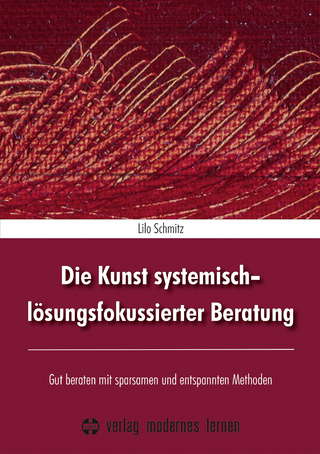Treatment and Management of Maladaptive Schemas
Springer International Publishing (Verlag)
978-3-319-06816-9 (ISBN)
Eric A. Kreuter is a partner with Marks Paneth LLP, a NYC-based regional accounting and business consulting firm. He specializes in litigation support and forensic investigations. Dr. Kreuter testifies as an expert witness in court. He has an undergraduate degree in Business Administration from Manhattan College, a Master of Arts degree in Industrial Psychology from Long Island University and a Doctorate in Clinical Psychology from Say brook University, where he also serves as a Trustee of the Board. Dr. Kreuter served as a Research Fellow with the Cambridge Institute for Psychology and Religion and is Editor of the International Journal for Psychology Research, published by Nova Science Publishers. He is a Certified Public Accountant and also holds certifications in the fields of management accounting, forensic investigations and human resource management. Dr. Kreuter has numerous publications in the fields of psychology, business, poetry and human resource management. He is a former Associate Professor of human resource management at Mercy College in Dobbs Ferry, New York. Dr. Kreuter is Treasurer of The National Association for Poetry, Inc and Board member of Hermandad, Inc.Kenneth M. Moltner is counsel to a New York City law firm, practicing commercial litigation and matrimonial law. He has presented Continuing Legal Education lectures to attorneys at the New York City Bar Association and the New York County Lawyer’s Association including on New York State litigation practice. He is an adjunct professor who teaches a continuing education course in Litigation at Hunter College and has taught at New York University’s SCPS. Mr. Moltner is a graduate of New York University, Phi Beta Kappa with Honors in Politics, and obtained his J.D. from New York University School of Law. His community experience includes service as a former Chair of a Manhattan Community Board, member of the board of a not-for-profit organization and a Special Master for a New York State Supreme Court Justice, among other positions. He is also a recipient of a New York City Council Proclamation for Community Service.
Introduction.- Paradigms and maladaptive schemas.- Shifting maladaptive spirituality.- Schema-focused cognitive therapy.- How do we define success?.- The source of paradigmatic thinking.- The problem of the static paradigm.- Catalyzing the hidden inner strength toward exploration.- Case examples of clients who shifted paradigms.- Restarting life at any age is possible.- Conclusions.
"What I call "dysfunctional personal myths," Dr. Eric A. Kreuter and Kenneth M. Moltner, Esq. refer to as "maladaptive schema." These are the beliefs, memories, and emotions that guide people's attitudes and behaviors, and often get them into no end of trouble. This groundbreaking book helps mental health practitioners (as well as anyone else who reads it) identify and change their clients' maladaptive schema into those that are positive, life-affirming, and adaptive. It also presents an original paradigm of consciousness that encompasses all areas of human growth and development, healthy and unhealthy, wise and downright stupid."
Stanley Krippner, Ph.D.
co-author, Personal Mythology
Professor of Psychology, Saybrook University
San Francisco
"Sadly, the reality of life is that most of us are exposed to trauma of one form or another in our lives. This book provides access to a fascinating way to think about how such events affect us, and, more importantly, a context and vocabulary to understand and ultimately suggest ways to alleviate the negative consequences of traumatic events on our lives. As Kreuter and Moltner say, "Unwinding the person's issues can be a complex undertaking." Their book provides intriguing insights and tools to help us on this journey. The underlining themes of hope and positive attitude support a framework for shifting one's paradigm and provide the opportunity for real change.
And don't skip the afterward and appendices! They offer intimate insight into the endearing heart and ever-curious mind of author Eric Kreuter and the wonderful family that surrounds him!"
Brendan D. Leonard, M.B.A.
Higher Education Management Consultant
Senior Vice President
Stevens StrategyFellow former Trustee with Eric Kreuter, Saybrook University
"What I call "dysfunctional personal myths," Dr. Eric A. Kreuter and Kenneth M. Moltner, Esq. refer to as "maladaptive schema." These are the beliefs, memories, and emotions that guide people's attitudes and behaviors, and often get them into no end of trouble. This groundbreaking book helps mental health practitioners (as well as anyone else who reads it) identify and change their clients' maladaptive schema into those that are positive, life-affirming, and adaptive. It also presents an original paradigm of consciousness that encompasses all areas of human growth and development, healthy and unhealthy, wise and downright stupid."Stanley Krippner, Ph.D.co-author, Personal MythologyProfessor of Psychology, Saybrook UniversitySan Francisco"Sadly, the reality of life is that most of us are exposed to trauma of one form or another in our lives. This book provides access to a fascinating way to think about how such events affect us, and, more importantly, a context and vocabulary to understand and ultimately suggest ways to alleviate the negative consequences of traumatic events on our lives. As Kreuter and Moltner say, “Unwinding the person’s issues can be a complex undertaking.” Their book provides intriguing insights and tools to help us on this journey. The underlining themes of hope and positive attitude support a framework for shifting one’s paradigm and provide the opportunity for real change. And don’t skip the afterward and appendices! They offer intimate insight into the endearing heart and ever-curious mind of author Eric Kreuter and the wonderful family that surrounds him!"Brendan D. Leonard, M.B.A.Higher Education Management ConsultantSenior Vice PresidentStevens StrategyFellow former Trustee with Eric Kreuter, Saybrook University
| Erscheint lt. Verlag | 15.8.2014 |
|---|---|
| Zusatzinfo | LVI, 227 p. 17 illus., 4 illus. in color. |
| Verlagsort | Cham |
| Sprache | englisch |
| Maße | 155 x 235 mm |
| Gewicht | 590 g |
| Themenwelt | Geisteswissenschaften ► Psychologie ► Humanistische Psychotherapien |
| Geisteswissenschaften ► Psychologie ► Klinische Psychologie | |
| Medizin / Pharmazie ► Gesundheitsfachberufe | |
| Medizin / Pharmazie ► Medizinische Fachgebiete ► Psychiatrie / Psychotherapie | |
| Schlagworte | effective coaching • inner strength • Mentoring • paradigmatic thinking • personal success • positive momentum • resilience and irrelevance • self-improvement • static paradigm • theory of paradigms • therapeutic bond • Therapeutic Intervention |
| ISBN-10 | 3-319-06816-4 / 3319068164 |
| ISBN-13 | 978-3-319-06816-9 / 9783319068169 |
| Zustand | Neuware |
| Haben Sie eine Frage zum Produkt? |
aus dem Bereich




